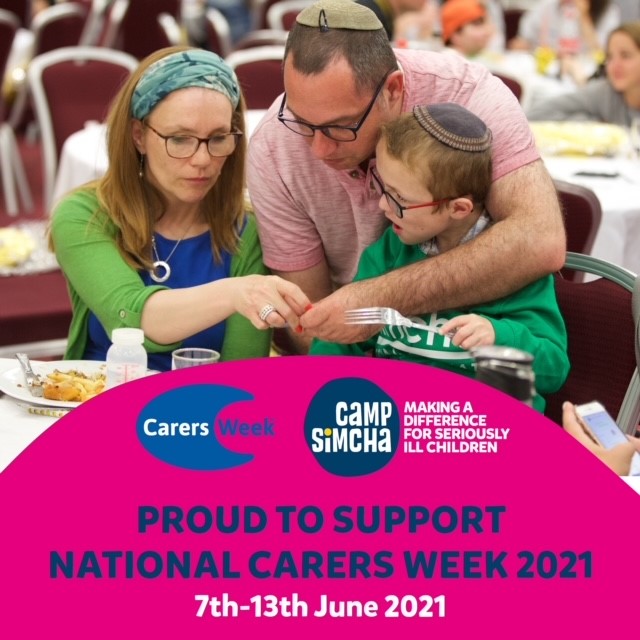


Chanochi Pearl is among the happiest, smiliest children we have the privilege of supporting at Camp Simcha. However behind his cheeky grin, the 11-year-old is coping with the impact of Familial Dysautonomia, a complex medical condition which affects the nervous system.
He has older twin sisters Meital and Sari, age 15, and a younger brother Eli, 6, and his parents Jane and Ian both work in demanding roles, respectively as a midwife and solicitor.
For National Carers Week, Jane has shared how challenging it can be managing Chanochi’s care needs with her other children and their work.
“On a daily basis Chanochi has constant care needs. He is nil by mouth so he has to have his liquids and daily medicines via a gastro tube and then his food via another tube, which bypasses his stomach so he can better tolerate it. He needs to be connected to this for 18 hours a day – and it needs topping up with medication during the day and night.
Chanochi doesn’t produce tears which makes his eyes vulnerable to corneal damage, so he has to have eye drops every two hours and ointment at night. His condition also means that he often has a disturbed night’s sleep. All this being said, he is a sunny, happy boy who brings so much joy to our house.
However, he also suffers from ‘autonomic crises’ – which means his body system goes haywire. When this happens his heart-rate and blood pressure goes high; he wretches constantly and he feels terrible, so he fears it happening because he knows it’s so horrible. We don’t know what brings it on, but it seems to come in cycles so once he has one, unfortunately we are on a roll.
We had had a really good couple of months up until just before Pesach this year, then Chanochi had one and it has been happening ever since. He will have 2 or 3 bad days then a good day, then several bad days again – it continues in this way but over time the number of bad days very slowly decreases and the gap between the bad days increases until we reach a good phase again.
As parents we are very pragmatic, but it’s fair to say the unpredictability is incredibly hard for family life and for our other three children. When Chanochi is in crisis, he needs much more monitoring, more medication and he becomes non-communicative; it’s very upsetting for all of us to see because normally he is such a happy child.
This is when Camp Simcha’s support is particularly crucial, especially the Big Brother and Big Sister volunteers who are there for each of the children. My daughter Meital has had the same Big Sister volunteer since she was just 3 – but they all love having that special person who is there for them, when they want to talk or just to have fun and spend time with.
It makes such a difference to us as a family.
As a midwife I need to be able to work on the days I am supposed to, so I have carers who come in on those days. However we are both very fortunate to have understanding workplaces that are supportive and flexible when needed.
I don’t really need much sleep but I think we do exist in a state of permanent tiredness. My job can be very demanding and the adrenalin always gets me through my shift but then when I get home I am shattered.
We love the respite that Camp Simcha retreat brings us and the joy it brings our children – even in lockdown when they ran it remotely. Our Family Liaison Officer has also sent in treats like dinner for two and some Shabbat meals. Mostly though it’s knowing we have the back-up of Camp Simcha being there when we need them.”